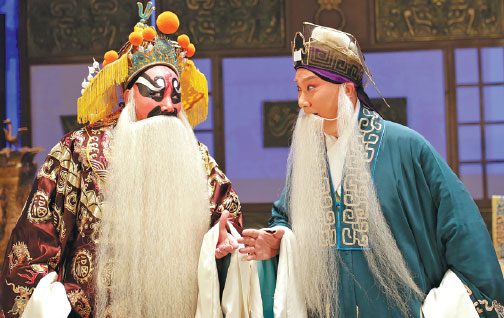Peking Opera on big screen
By Xu Fan (China Daily) Updated: 2017-04-21 07:11|
A project has brought together top opera companies and movie studios to convert classic Peking Opera titles into feature-length movies, including The Mirror of Fortune and The Chinese Orphan. Photos Provided To China Daily |
An ongoing project to turn performances of an ancient art form into movies is getting a boost with plans to make more such films. Xu Fan reports.
For two days in a row recently, Peking Opera master Du Jinfang used a hearing aid to listen to speeches about the struggling art form at the ongoing 7th Beijing International Film Festival. After the speeches, the 85-year-old artist was a bit tired, but she was excited about the progress made by the Peking Opera Film Project, which brings together top opera companies and movie studios to convert classic shows into feature-length movies.
"I began to learn the opera as a 6-year-old, and took leads at 16. But most of the performers nowadays are in their 30s. We are short of replacements," she says.
"But thanks to the project, young performers will be encouraged and the opera will be revived," she adds.
Since 2011, the project has led to the production of 10 movies, such as Mu Guiying Assuming Command, The Chinese Orphan, The Mirror of Fortune and Xie Yaohuan. And six of them have been screened at international film festivals, bagging 13 awards.
The project envisages the production of another 10 such movies in the next three years.
From the six award winners, Farewell My Concubine - a 2,200-year-ago romance about a hero and his lover - has been screened in the United States, Japan, Britain, New Zealand and Australia, and will be screened in more foreign countries in the next few months.
Opera buffs in Beijing will also get a chance to savor the classics.
As part of the Beijing film festival's Peking Opera section, all the movies are being screened in three cinemas in Beijing's Chaoyang district.
The opera movies will be screened in the mornings for free in these theaters for the rest of this year, according to the festival organizers.
With this new initiative, the total number of screenings could hit 500.
Celebrities, critics and filmmakers see the project - the largest of its kind in New China's history - as a new chapter for the art form, which goes back more than 200 years.
Li Enjie, head of the Jingju Theater Company of Beijing, says Peking Opera dates back to 1790 when troupes from Anhui province brought the opera to Beijing to mark the birthday of then-emperor Qianlong, a turning point for the art form.
Interestingly, the links between Peking Opera and cinema go back to 1905, when the first Chinese movie The Battle of Dingjunshan was made.
The 30-minute movie, based on the 14th-century novel Romance of the Three Kingdoms, was a recording of an opera show performed by then-celebrity artist Tan Xinpei.
Movies based on Peking Opera featuring top performers were box-office hits in the 1930s and 1940s, and hit a new high in the 1960s and 1970s with the so-called yangbanxi (revolutionary model dramas).
However, as pop culture took hold, the following for traditional opera died.
But Li believes cinema can help Peking Opera regain its popularity, a view shared by others.
Liu Changyu, a famous Peking Opera artist, says: "The big screen can highlight facial expressions, gestures and relevant details to give the audience a clearer view of the performance.
"Also, as seats in traditional theaters are limited, the cinematic versions can overcome the limitations of time and space, and give classic performances immortality.
"So, even though the artists pass away, the essence of their performances can be preserved."
Echoing her words, Ma Chongjie, director of the Peking Opera films Xie Yaohuan and The Chinese Orphan, says such movies are a treasure for future generations.
Xie Yaohuan is about a female official from the Tang Dynasty (618-907) who serves the Empress Wu Zetian, while The Chinese Orphan is an unlikely story about revenge.
Focusing on the challenges faced in making such movies, Ma says: "The main issues for the crews are how to shoot such a film and what content to keep out."
Typically, most of the classic shows, selected by a 21-consultant team run for around three hours on stage, but a movie usually lasts for around two hours.
Ma says a Peking Opera movie director has to be familiar with music, characters and drama structure to make the correct cuts.
Praising the ongoing Peking Opera Film Project, Cui Wei, the secretary-general of China Theater Association, says while in the past, such movies were produced by just one theater company and one studio, the State-backed effort has led to the teaming up of top talent, with most of the movies boasting an all-celebrity cast.
"Audiences can now see performances from different schools (of Peking Opera) in one movie," says Cui.
Wang Xiaoxin, a veteran scriptwriter and researcher, says Peking Opera films will also appeal to foreign audiences.
Contact the writer at xufan@chinadaily.com.cn
- 'Cooperation is complementary'
- Worldwide manhunt nets 50th fugitive
- China-Japan meet seeks cooperation
- Agency ensuring natural gas supply
- Global manhunt sees China catch its 50th fugitive
- Call for 'Red Boat Spirit' a noble goal, official says
- China 'open to world' of foreign talent
- Free trade studies agreed on as Li meets with Canadian PM Trudeau
- Emojis on austerity rules from top anti-graft authority go viral
- Xi: All aboard internet express












